

Fridays for Future Took Foreign Policy Out of the Hands of Bureaucrats and Officials in 2019. Next Year, Greta Thunberg’s Movement Could Go Further. Young people march with banners and placards during a Fridays for Future demonstration in Berlin on March 15.
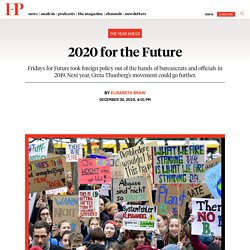
Tobias Schwarz/AFP/Getty Images They kept negotiating and negotiating and negotiating. In the end, though, the only thing the world’s governments could agree on at their 25th conference on climate change that ended in Madrid in mid-December was to defer all decisions to their next gathering. That’s a pity, because time is quickly running out on keeping global warming under the crucial 2 degrees Celsius mark. It is a good thing that, in 2019, the climate had other forceful defenders in the form of Fridays for Future, a new movement founded and led by children, teenagers, and other young people. “They certainly drove us to speed up,” German Chancellor Angela Merkel said this past July, referring to the impact of Fridays for Future on German climate change policies. This is what millennials think about war. 54% of young people people surveyed felt a nuclear attack was likely in the next decade.
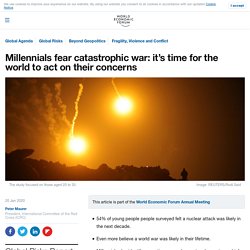
Even more believe a world war was likely in their lifetime. NOwnership, No Problem: An Updated Look At Why Millennials Value Experiences Over Owning Things. World War II was a devastating time for the world.
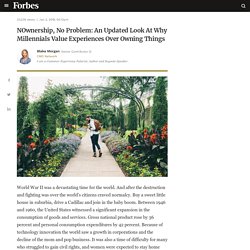
And after the destruction and fighting was over the world’s citizens craved normalcy. Buy a sweet little house in suburbia, drive a Cadillac and join in the baby boom. Between 1946 and 1960, the United States witnessed a significant expansion in the consumption of goods and services. Gross national product rose by 36 percent and personal consumption expenditures by 42 percent. TikTok to Facebook: OK Boomer. Societies change their minds faster than people do - Talkin’ ’bout my generation.
‘OK Boomer’ Marks the End of Friendly Generational Relations. Nina Kasman, an 18-year-old college student selling “ok boomer" stickers, socks, shirts, leggings, posters, water bottles, notebooks and greeting cards, said that while older generations have always looked down on younger kids or talked about things “back in their day,” she and other teens believe older people are actively hurting young people.

“Everybody in Gen Z is affected by the choices of the boomers, that they made and are still making,” she said. Deloitte Global Millennial Survey 2019. How 9/11 Changed America: Four Major Lasting Impacts (with Lesson Plan) Below are four of the many dramatic impacts -- nationwide and in California -- resulting from the events of that one tragic day.
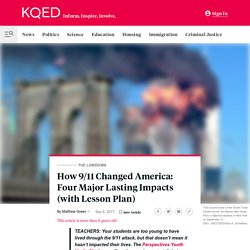
I. Ongoing wars Less than a month after 9/11, U.S. troops invaded Afghanistan in an attempt to dismantle al-Qaeda -- the terrorist group that claimed responsibility for the attacks -- and remove the Taliban government harboring it. Two years later, in March 2003, the United States invaded Iraq and deposed President Saddam Hussein. Although not directly linked to the terrorist attacks, Hussein was suspected of producing weapons of mass destruction (none were ever found).
Our military involvement in Afghanistan, which continues today, has turned into the longest-running war in U.S. history. In December 2011, remaining U.S. troops were pulled out of Iraq, leaving that nation in a far more volatile state than when military operations first began in 2003. According to U.S. Asia’s digital millennials: Mobile, social and borderless - The Economist Intelligence Unit (EIU) Common Futures Conversations – Chatham House. The Next Recession Will Destroy Millennials. Kids of the 1980s and 1990s have had a new, huge, financially catastrophic demand on their meager post-recession earnings, too: a trillion dollars of educational debt.
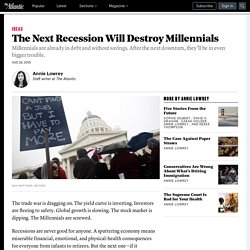
About a quarter of Gen Xers who went to college took out loans to do so, compared with half of Millennials. And Millennials ended up taking out double the amount that Gen Xers did. No wonder, given that the cost of tuition has gone up more than 100 percent since 2001, even after accounting for inflation. The toxic combination of lower earnings and higher student-loan balances—combined with tight credit in the recovery years—has led to Millennials getting shut out of the housing market, and thus losing a seminal way to build wealth.
There are always questions about the future. There are always questions about the future.

It’s the only thing we don’t know. We don’t know what will happen in the future, so we ask lots of questions. How China Became Capitalist. Capitalism and Democracy in 2040. NBER WORKING PAPER SERIESCAPITALISM AND DEMOCRACY IN 2040:FORECASTS AND SPECULATIONSRobert W.

FogelWorking Paper BUREAU OF ECONOMIC RESEARCH1050 Massachusetts AvenueCambridge, MA 02138June 2007The views expressed herein are those of the author(s) and do not necessarily reflect the views of theNational Bureau of Economic Research. 2007 by Robert W. Fogel. All rights reserved. McKinsey: Influence of family businesses rising globally. Marriages and birth rate in South Korea fall to record lows, according to census statistics. Many South Koreans are delaying marriage, or choosing not to tie the knot at all.
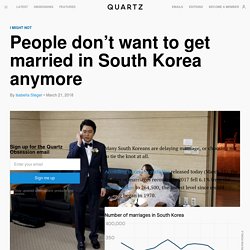
According to census statistics released today (March 21), the number of marriages recorded in 2017 fell 6.1% from the previous year to 264,500, the lowest level since record keeping began in 1970. The falling number of marriages has been largely attributed to economic factors, including low pay, poor job security, and lack of affordable housing. Marriage losing appeal for Korean women. Young Japanese Men and Women Reject Marriage, and Ultimately Each Other – Japan Subculture Research Center. According to this article, Japanese over 35 may find it “impossible” to wed.

I don’t - Marriage in Japan. An in-depth look at news from across the continent. Looking back, Makoto Watanabe wishes he had gotten married in his early 30s, but he admits back then he had neither the job security nor the financial resources to support a wife and family. Young People Are Choosing to Live in “Pods” Instead of Apartments. Pod Life Young people have long chosen to rent coworking spaces and take rideshares instead of buying cars. Now, some are pushing the sharing economy to its logical conclusion: NPR reports that young people in Los Angeles — and other cities around the country — are choosing to rent small pods instead of an apartment. Expensive Future. Karoline Kan on being a Chinese millennial. Change the narrative: how a Swiss group is beating rightwing populists.